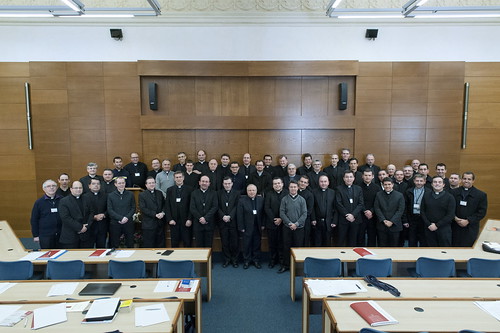IV Workshop for Seminary Formators

The Center for Priestly Formation has organized a Study Week between February 1st and 5th dedicated to the spiritual formation of candidates for the priesthood.
With this initiative, the CFS wanted to contribute to the ongoing formation of the priests that, in turn, give formation to candidates for the priesthood. The Study Week offers an ideal environment for sharing experiences and reflecting on proposals from specially qualified rapporteurs in the field.
About eighty participants -rectors, spiritual directors, and formators- coming from dioceses of several continents, gathered in the Aula Alvaro del Portillo of the University to exchange and discuss experiences about their work in seminaries around the world.
The workshop was inaugurated by S.E.R. Mons. Jorge Carlos Patrón Wong, Secretary of the Congregation for the Clergy. Quoting various words of Pope Francis, Mons. Patron said that "there is a need for priests who have the compassionate heart of the Good Shepherd, and thus become channels of the grace and mercy of the Father." For this service to the Christian people, candidates need "a mature personality, a deep spirituality, a strong academic and cultural preparation, a pastoral and missionary sensibility directed by charity". Hence the importance of spiritual formation, which, in short, "seeks to inspire a desire for holiness in candidates for the priesthood." The task of those who work at the seminary is therefore to "train the man, the disciple, the priest, in a harmony as integrated as possible between prayer, pastoral, and culture."
The participation of several Bishops was particularly interesting, as they reflected on their own experience as seminary rectors or formators, or the attention that is now given to their candidates. S.E.R. Msgr. Arturo Aiello, Bishop of Teano-Calvi, spoke about education to communion; S.E.R. Msgr. Stefano Manetti, Bishop of Montepulciano-Chiusi-Pienza, focused on communication in spiritual fatherhood; S.E.R. Msgr. Francesco Marino, Bishop of Avellino, spoke about the role of the formator; and S.E.R. Msgr. José María Yanguas, Bishop di Cuenca (Spain), spoke on priestly spirituality.
The other speakers were professors of pontifical universities or priests who work in the formation of priests and seminarians. Msgr. Luis Romera, rector of the Pontifical University of the Holy Cross, spoke about the anthropological foundations of spiritual formation; Msgr. Guillaume Derville focused his presentation on education to chastity; and Prof. Paul O'Callaghan ellaborated upon the role of spiritual director at the seminary.
There were also conferences about the various dimensions of the piety of the candidates: Eucharistic life (Msgr. Rosario La Delfa), prayer (Prof. Javier Lopez), and penance (Rev. Alfredo Ruiz de Gámiz).
The afternoon sessions had a more practical and interactive orientation in workshop format, dedicated to books for spiritual formation (moderated by Prof. Laurent Touze), retreats and spiritual exercises (Prof. Javier Canosa), and relations between psychology and spiritual life (Prof. Wenceslao Vial).
